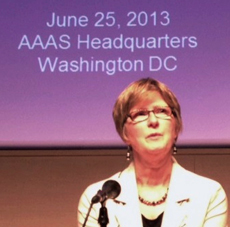Increasing demand for major crops and the use of biotechnology in agriculture was the topic during the American Association for the Advancement of Science’s Charles Valentine Riley Memorial Lecture in New York on Tuesday.
The main lecturer, Dr. Stephen Long, Professor of Plant Biology and Crop Sciences at the University of Illinois, said the demand for major crops is expected to rise 50 percent by 2030. He also emphasized that the use of commodities for energy as well as food and feed comes at a time when increases in yield are stagnating. However, he pointed out that new biotechnological approaches are providing opportunities to overcome these limitations, but that societal and policy acceptance of these opportunities is likely the greatest barrier.
 A panel following the lecture included National Corn Growers Association President Pam Johnson, Massachusetts Farm Bureau Federation president Richard Bonanno, and Director of USDA’s National Institute of Food and Agriculture Sonny Ramaswamy – who participated in last week’s IFAMA World Forum.
A panel following the lecture included National Corn Growers Association President Pam Johnson, Massachusetts Farm Bureau Federation president Richard Bonanno, and Director of USDA’s National Institute of Food and Agriculture Sonny Ramaswamy – who participated in last week’s IFAMA World Forum.
“The continued use of biotechnology in agriculture is a key component to food security,” Johnson said. “However, we need to greatly improve the public’s acceptance of biotechnology. Agriculture needs to lead the conversation on this important topic and provide education on the advancements of the industry. Consumers should be able to make decisions based on science and facts, not fearmongering.”
The Charles Valentine Riley Memorial Lecture at AAAS is in honor of Professor Riley’s legacy as a “whole picture” person with a vision for enhancing agriculture through scientific knowledge. The AAAS Riley Lecture addresses timely topics such as the role food, agriculture and natural resources play in providing a secure food supply and a sustainable economy.
